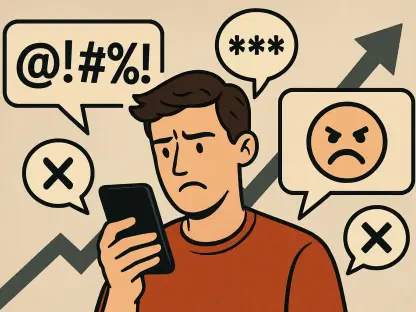The recent directive from the UK’s communications regulator, Ofcom, has introduced new online safety laws that social media platforms must now adhere to, marking a significant shift in how these platforms operate in terms of safety regulations and compliance. Following the passing of the Online Safety Act in October 2023, this move aims to reduce users’ exposure to harmful online content. Platforms like X (formerly Twitter), YouTube, OnlyFans, Google, and Meta are now under stringent obligations to conduct illegal harm risk assessments within three months and to comply with comprehensive safety measures by March 2025.
The Online Safety Act: A New Era of Regulation
The Online Safety Act empowers Ofcom to impose strict compliance requirements on online platforms to tackle various illegal harms, establishing a new framework for dealing with problematic content. These harms include promoting terrorism, hate speech, fraud, child sexual abuse, and actions that encourage suicide. By publishing the first edition codes of practice and providing guidance, Ofcom clearly signals its intent to enforce stringent actions against non-compliant platforms. These initial guidelines compel platforms to conduct and complete their illegal harm risk assessments by mid-March 2024.
After the assessment period, companies will implement comprehensive safety measures starting from March 17, 2025. Ofcom’s guidance emphasizes reducing harmful content exposure for all users, with a keen focus on children’s safety. This marks a significant shift, underlining the urgency to tackle harmful materials and improve user safety. These efforts from Ofcom are intended to secure a safely regulated online environment, ensuring the internet can be a safer space for everyone.
Senior Accountability and Enhanced Moderation
Platforms are now required to designate a senior official accountable to their top governance body for compliance with regulations concerning illegal content, reporting, and handling complaints. This directive aims to pressure senior leadership to integrate safety measures as a core part of operational strategy, extending responsibility beyond mere profitability concerns. The presence of a dedicated senior official underscores the importance of addressing illegal content with targeted and effective actions.
Moreover, companies are urged to allocate better resources and provide adequate training for their moderation teams, equipping them to swiftly remove illegal content. Moderators must meet strong performance goals to ensure timely removal of harmful materials. Alongside enhanced moderation, platforms must simplify reporting and complaint functions for users. The directive includes improving algorithm testing to reduce the proliferation of illegal content. This approach emphasizes robustness in proactive content moderation and straightforward user interface enhancements for reporting violations.
Protective Measures for Children
Ensuring child safety online is a major focal point of the new regulations. Platforms must enhance their safety protocols to shield children from sexual abuse and exploitation. Essential measures include making children’s profiles and locations fail-safe from visibility to strangers, and prohibiting unsolicited messages from non-connected accounts. These steps are crucial for protecting young users from predatory behavior. Additionally, platforms are expected to provide educational insights to children regarding the inherent risks of sharing personal information online, fostering awareness and informed usage among young users.
Ofcom’s directives aim to create a comprehensively safer online environment for children, significantly reducing the risk of harm. The guidelines are designed to make digital spaces secure, where children can interact and learn without fear of undue harm. By implementing these protective measures, social media platforms can foster a safer and healthier digital experience for young users, prioritizing their well-being and protection.
Fines, Penalties, and Compliance
Ofcom has been empowered to issue substantial fines for non-compliant companies, with penalties reaching up to £18 million or 10% of global revenues, whichever is greater. This significant financial threat is intended to ensure serious adherence to the new safety laws. In extreme cases of non-compliance, Ofcom can escalate measures by blocking access to the infringing site within the UK, acting as a strong deterrent against ignoring the regulations.
The formulation of these regulations involved consultations with a broad range of stakeholders, including civil society, the tech industry, charities, campaigners, and law enforcement. This extensive consultation process ensures that the measures are pragmatic, balanced, and feasible in addressing the complexities of such regulations. Balancing stakeholders’ inputs aims at a comprehensive approach where effective enforcement meets practical application.
Future Codes and Guidance
While the newly published codes are a foundation, they indicate the beginning of more extensive regulation. Ofcom has outlined plans for further measures by Spring 2025, targeting specific issues like blocking accounts sharing Child Sexual Abuse Materials (CSAM). Deploying artificial intelligence (AI) to tackle illegal harms, using hash-matching, and URL detection methods aims to prevent the dissemination of non-consensual intimate imagery and terrorist content. These future steps show an ongoing commitment to developing and enhancing regulatory frameworks as technology and societal needs evolve.
The broader trend emerging from these regulations underscores a shift towards structured accountability and heightened safety standards within the technology sector. Historically, tech companies emphasized profits over user safety, operating with minimal regulation on content. These new regulations serve to oblige companies to prioritize user safety, reinforcing accountability and ensuring a safer digital landscape.
Balancing Safety and Privacy Concerns
While the introduction of these regulations is met with significant support, it also generates criticisms and concerns, particularly regarding privacy issues. Some argue that enhanced safety measures might lead to government overreach, particularly in aspects like end-to-end encryption. This robust encryption plays a crucial role in ensuring online privacy but might be compromised under the new safety directives, raising valid concerns about individual privacy rights versus collective safety.
The consensus among campaigners and Ofcom remains that these regulatory steps are crucial in curbing the spread of harmful online content. However, there is also recognition of the inherent complexities in enforcing these regulations effectively, especially considering the global nature of the tech industry. The potential resistance from sectors advocating for unfettered free speech principles further complicates the process. Nonetheless, the initiative focuses on creating a balance where safety does not excessively undermine privacy rights.
A Safer Online Ecosystem
The UK’s communications regulator, Ofcom, recently issued a directive that introduces new online safety laws for social media platforms. This marks a significant change in how these platforms must function concerning safety regulations and compliance. Stemming from the passage of the Online Safety Act in October 2023, the initiative aims to significantly reduce users’ exposure to harmful web content. Platforms like X (formerly known as Twitter), YouTube, OnlyFans, Google, and Meta are now compelled to adhere to these stringent new guidelines. They are required to conduct assessments of potentially illegal harm risks within three months and are expected to implement comprehensive safety measures fully by March 2025. These changes mean that social media companies will need to be more proactive in monitoring and managing the content on their platforms, ensuring safer environments for all users. This shift is crucial as it attempts to address growing concerns regarding online harms and the impact of harmful content on the public.









